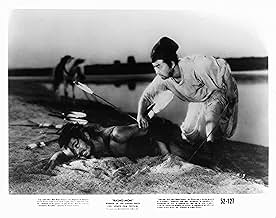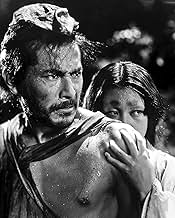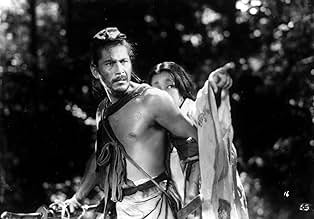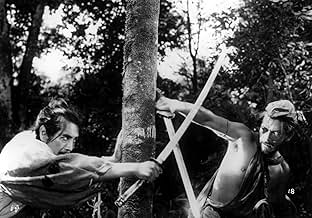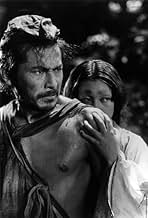The rape of a bride and the murder of her samurai husband are recalled from the perspectives of a bandit, the bride, the samurai's ghost and a woodcutter.The rape of a bride and the murder of her samurai husband are recalled from the perspectives of a bandit, the bride, the samurai's ghost and a woodcutter.The rape of a bride and the murder of her samurai husband are recalled from the perspectives of a bandit, the bride, the samurai's ghost and a woodcutter.
- Director
- Writers
- Stars
- Nominated for 1 Oscar
- 9 wins & 5 nominations total
- Director
- Writers
- All cast & crew
- Production, box office & more at IMDbPro
Summary
Reviewers say 'Rashomon' delves into the nature of truth and reality through multiple conflicting perspectives of a crime. Characters like the bandit, wife, samurai, and woodcutter offer varied accounts, showcasing subjective truth and human perception's unreliability. The film challenges viewers to question truth and personal biases' impact on storytelling. Its innovative narrative and cinematography highlight human nature's complexity and the struggle to find objective truth, receiving both acclaim and critique for its profound themes and structure.
Featured reviews
Rashomon by Akira is probably one of his very best, from his storytelling to the visuals, the picture is amazing.
The film is about about the truth, and burying it because no one can handle it. People prefer to live a lie than admit the truth, very reminiscent of today's world. The characters are talking to us, we are the jury.
The performances are amazing, nothing acting is so good, blows away today's competition.
The film score is stunning as well, one of my favourites from a Japanese film.
The direction is breathtaking, the jungle is beautifully lit, it has a sense of horror to it. Black and white was the perfect choice.
Overall, an amazing film from a genius!
The film is about about the truth, and burying it because no one can handle it. People prefer to live a lie than admit the truth, very reminiscent of today's world. The characters are talking to us, we are the jury.
The performances are amazing, nothing acting is so good, blows away today's competition.
The film score is stunning as well, one of my favourites from a Japanese film.
The direction is breathtaking, the jungle is beautifully lit, it has a sense of horror to it. Black and white was the perfect choice.
Overall, an amazing film from a genius!
Kurosawa tells a story four times through different characters. The characters tell the story different four times. In flash-backs, all as the characters tell them, we see the stories. Are they lying, are they all telling their own truth or is there someone who tells THE truth? The way this is handled by Kurosawa is absolutely masterful.
Of course, his direction is great. Together with cinematographer Kazuo Miyagawa they do a tremendous job with the atmosphere in the woods. With perfect light angles it looks beautiful.
A real Japanese classic.
Of course, his direction is great. Together with cinematographer Kazuo Miyagawa they do a tremendous job with the atmosphere in the woods. With perfect light angles it looks beautiful.
A real Japanese classic.
"Rashomon" was Akira Kurosawa's first national hit (becoming, at the time, the highest-grossing foreign film in America) and even gained an Oscar for Best Foreign Film, but almost sixty years later it still hasn't lost any of its impact. It is widely revered as one of the most influential films of all-time, but unlike some other movies, it is not a film that feels dated. The revolutionary methods of Kurosawa are still effective and on-par with the cinema of today -- this isn't a movie where you say, "Yeah, fifty years ago it might have been different, but now it's done in all the movies." Kurosawa's techniques are still superior to most of his imitators. Look at the 2003 John McTiernan film, "Basic," which copies a good portion of "Rashomon's" concept. Which is the better film? It's not a hard choice.
The film begins under a structure which reads "Rashomon" on its exterior, in a small Japanese village. It's raining outside and a woodcutter (Takashi Shumura) and a priest (Minoru Chiaki) inadvertently find themselves in the company of a wandering commoner (Kichijiro Ueda), and as he asks them what is the matter they both begin to relay the most horrific story they claim to know -- of a brutal murder a few days prior.
Kurosawa then switches to flashback and we see three different versions of the exact same event -- the slaying of an innocent man (the murderer played by Kurosawa film regular Toshirô Mifune) in the woods outside the village. Was it because of lust? Betrayal? Envy? Or insanity? We hear from the murderer, the wife of the victim, and a woman channeling the spirit of the dead man.
"Rashomon" is brilliant. Some people have complained that the ending is a cop-out and sentimental hogwash, but I think Kurosawa was fond of sentimentality to a point (he uses a good deal of it in "Ikiru") but the difference between what he does with sentimentality as opposed to many filmmakers of today is that he uses to to ENRICH the story, not provide an easy solution to all the problems.
Is there resolution in the finale of "Rashomon"? To a degree. But, like "Ikiru," it also leaves an open answer to its audience -- this film questions us, and our humanity, and it says something about the human condition and our weaknesses as a species. Yet it also proposes that along with the evil is an inherent good, and in my opinion the message of "Rashomon" is just as important and effective as its film-making techniques and acting.
The film begins under a structure which reads "Rashomon" on its exterior, in a small Japanese village. It's raining outside and a woodcutter (Takashi Shumura) and a priest (Minoru Chiaki) inadvertently find themselves in the company of a wandering commoner (Kichijiro Ueda), and as he asks them what is the matter they both begin to relay the most horrific story they claim to know -- of a brutal murder a few days prior.
Kurosawa then switches to flashback and we see three different versions of the exact same event -- the slaying of an innocent man (the murderer played by Kurosawa film regular Toshirô Mifune) in the woods outside the village. Was it because of lust? Betrayal? Envy? Or insanity? We hear from the murderer, the wife of the victim, and a woman channeling the spirit of the dead man.
"Rashomon" is brilliant. Some people have complained that the ending is a cop-out and sentimental hogwash, but I think Kurosawa was fond of sentimentality to a point (he uses a good deal of it in "Ikiru") but the difference between what he does with sentimentality as opposed to many filmmakers of today is that he uses to to ENRICH the story, not provide an easy solution to all the problems.
Is there resolution in the finale of "Rashomon"? To a degree. But, like "Ikiru," it also leaves an open answer to its audience -- this film questions us, and our humanity, and it says something about the human condition and our weaknesses as a species. Yet it also proposes that along with the evil is an inherent good, and in my opinion the message of "Rashomon" is just as important and effective as its film-making techniques and acting.
It's hard to tell just how striking "Rashômon" might have seemed to those who watched it in 1950, rather than seeing it after so many subsequent movies and other works have made use of its techniques and ideas. But it's clear that it is a technical and creative success. The story itself is not particularly satisfying, which was most likely by design, and the movie is carried by its structure and by the concept of the markedly different perspectives on the same series of events. The cast also deserve their share of credit for how well it works, and the photography is excellent, as it is in almost all of Kurosawa's films.
Kurosawa's expertise makes the interwoven sequences of past and present - essentially telling two different stories - not only work flawlessly, but fit together thematically. It's even more commendable when compared to some of the subsequent films that have tried to use similar ideas, only to come off as pretentious rather than creative or innovative. Kurosawa was also working with much less in terms of possible precedents.
In one sense, the choice of specific story material could seem a little odd.
The downbeat, rather sordid scenario makes the movie somewhat less enjoyable than several of Kurosawa's other pictures (which is, admittedly, a pretty high standard), and as a result "Rashômon" is more a film to respect and admire than one to enjoy and take pleasure from. Still, it does have significantly more substance to it than do most of the more recent pictures that have been deliberately downbeat or negative in their portrayals of humanity. Such stories are more trendy at present, and they often receive undue praise simply for so being.
At the same time, the lack of sympathetic characters and the paucity of hopeful developments bring out all the more its success in developing its ideas about narrative and about reality, ideas that are more fundamental and, in their way, perhaps at least as important as any specific story or events.
Kurosawa's expertise makes the interwoven sequences of past and present - essentially telling two different stories - not only work flawlessly, but fit together thematically. It's even more commendable when compared to some of the subsequent films that have tried to use similar ideas, only to come off as pretentious rather than creative or innovative. Kurosawa was also working with much less in terms of possible precedents.
In one sense, the choice of specific story material could seem a little odd.
The downbeat, rather sordid scenario makes the movie somewhat less enjoyable than several of Kurosawa's other pictures (which is, admittedly, a pretty high standard), and as a result "Rashômon" is more a film to respect and admire than one to enjoy and take pleasure from. Still, it does have significantly more substance to it than do most of the more recent pictures that have been deliberately downbeat or negative in their portrayals of humanity. Such stories are more trendy at present, and they often receive undue praise simply for so being.
At the same time, the lack of sympathetic characters and the paucity of hopeful developments bring out all the more its success in developing its ideas about narrative and about reality, ideas that are more fundamental and, in their way, perhaps at least as important as any specific story or events.
Kurosawa's magic film is a composite of 2 Japanese short stories by Ryunosuke Akutagawa: One, "Rashomon," the title tells of a confrontation of a young man at Rashomon, the large, fortified gate at one entrance to Kyoto where people would abandon children and corpses; the other, yabu no naka ni, "In a Grove," tells of the confrontation between the bandit, the samurai and his wife, told from the point of view of the woodcutter. In 1950, Kurosawa weaves this tale of human vanity and duplicity with the young Toshiro Mifune, as the bandit, Machiko Kyo as the lady and Masayuki Mori as the samurai. The tale unfolds through the flashbacks in the narration of the great Takashi Shimura as the woodcutter, supported by character actors Minoru Chiaki as the monk and Kichijiro Ueda as the bum. Basically, with a cast of six and the stark settings of a woods and a dilapidated castle gate in pouring rain, Kurosawa the magician gives us four views of human vanity, excessive pride and cultural conflict. The foibles of human needs are exposed but redeemed in the final scene where the basic act of kindness brings closure to the bizarre display of greed, lust and mendacity that has gone before. For a Kurosawa film, this one is short, to the point with an economy of emoting-- for which Mifune was never accused of under doing and the viewer is left somewhat exhausted by all the twists and turns, confused by the mix of contradictions and seeming paradox, but satisfied with a feeling of hope.
Did you know
- TriviaOften credited as the reason the Academy created the "Best Foreign Film" category.
- GoofsAt the beginning of the film when the woodcutter finds the dead body, the arms and hands are stiff and raised. However; you can see both arms slightly moving. Apparently, they used a real person, and the actor playing the dead person was unable to keep the arms perfectly still.
- Alternate versionsCriterion Collection releases of this film feature an English Dubbed Version in addition to the traditional, original Japanese version. This is unusual in that Criterion are usually film purists that do not put English language dubs on their discs that contain a foreign language film.
- ConnectionsEdited into Papillon d'amour (2004)
- SoundtracksWoman's Tale Theme (Bolero)
Written by Fumio Hayasaka inspired by Maurice Ravel's "Bolero", using the same background rhythm, and similar orchestration and build-up, but different melodic lines.
Details
Box office
- Budget
- $250,000 (estimated)
- Gross US & Canada
- $46,808
- Opening weekend US & Canada
- $15,942
- Jul 28, 2002
- Gross worldwide
- $141,708
- Runtime
- 1h 28m(88 min)
- Color
- Aspect ratio
- 1.37 : 1
Contribute to this page
Suggest an edit or add missing content


